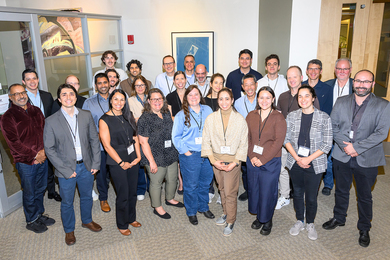Americans may be addicted to oil, as President Bush charged in his 2006 State of the Union message, but that addiction can be managed if international security issues and technological advances are part of the treatment plan, according to two experts on different aspects of petroleum's power in the United States.
Barry R. Posen, the Ford International Professor of Political Science, and Ernest J. Moniz, the Cecil and Ida Green Professor of Physics and Engineering Systems and co-chair of the MIT Energy Research Council, discussed how U.S. fuel consumption can persist during the forum, "Are We Too Dependent on Middle Eastern Oil?" held Friday, April 28, in Room E51-335.
Posen opened the forum by challenging those in the crowded room to ask, "Who is this 'we'? There's one oil market. It's not how much the U.S. imports from any one country; it's that, if one country goes 'off-market,' all industrial countries feel it."
A specialist in grand strategy, Posen pointed to the geopolitical and topographical significance of the world's oil supply. "If the world's oil came from the North Sea, there would be no conversation. But the Persian Gulf is a funny place: Middle Eastern countries are not stable market democracies, and oil itself feeds nasty domestic politics," he said.
"Oil importers face two sets of problems -- local politics and cash floating around in volatile areas. Ever since former President Jimmy Carter warned that an attack on a Gulf state would be treated as an attack on the U.S., we have poured military money, power and lives into the Middle East. My question is, is the game worth the candle?" Posen said.
Moniz, who is also co-director of the MIT Laboratory for Energy and the Environment (LFEE), served as undersecretary of the U.S. Department of Energy from October 1997 to January 2001.
He picked up the addiction thread, describing the United States as a dependent consumer of oil whose dependence is "almost certain to grow in the next 20 years" thanks to the need to fuel transportation.
In addition, "ongoing tight market conditions are likely to persist, ensuring that our dependency on oil will drive prices higher," he warned.
Moniz offered an ambivalent response on whether the United States is "too dependent" on Middle Eastern oil.
"We are too dependent on Middle Eastern oil, in the sense that Saudi Arabia may soon produce 12 million barrels a day, so their stability is critical for the global oil market," he said.
On the other hand, the consequences of dependency are judged by what options are available. "We have significant reserves to handle modest disruptions, the market functions fairly well, and for the long term we have the capability through technology and policy to manage demand and to produce alternative fuels -- although perhaps not the will to do so meaningfully until the situation is still worse," he said.
Moniz emphasized the important difference between the oil-dependent transportation fuels sector and the relatively elastic power sector, with its "considerable fungibility with fuels, including coal, gas and nuclear."
He also called for harmonization of environmental regulations among regions and countries to make more efficient use of oil products.
A version of this article appeared in MIT Tech Talk on May 3, 2006 (download PDF).






